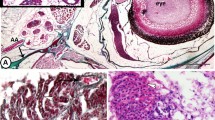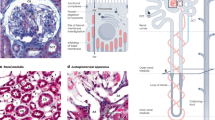Abstract
In Antarctic notothenioid fishes large amounts (3% w/v) of small molecular weight glycoproteins lower the freezing point of the body fluids a few tenths of a degree below the freezing point of seawater (−1.9°C), enabling these animals to avoid freezing1. Although these glycoproteins have molecular weights of 2,600–23,500 and would be expected to be filtered into the urine, they remain in the blood because the kidneys of these fishes contain only aglomerular nephrons2,3. Unlike the situation in most fishes, urine formation is the result of secretion rather than filtration and reabsorption. On the other hand, the peptide antifreezes in Northern Hemisphere fishes such as the winter flounder4, Pseudopleuronectes americanus, are retained by the glomerular kidney even though inulin, of comparable weight, is rapidly filtered from the blood into the urine5. The Antarctic eelpout (zoarcid), Rhigophila dearborni, which is unrelated to either the Antarctic notothenioids or P. americanus, also uses a peptide antifreeze (molecular weight 6,000) which is maintained at a concentration of 3% (w/v) in the blood plasma. We report here that the lack of antifreeze in the urine of R. dearborni probably reflects the fact that the glomeruli are not functional and cannot filter. We support this conclusion with morphological and physiological evidence and relate our findings to the conservation of biological antifreeze necessary for life in ice-laden polar waters.
This is a preview of subscription content, access via your institution
Access options
Subscribe to this journal
Receive 51 print issues and online access
$199.00 per year
only $3.90 per issue
Buy this article
- Purchase on Springer Link
- Instant access to full article PDF
Prices may be subject to local taxes which are calculated during checkout
Similar content being viewed by others
References
DeVries, A. L. Science 172, 1152–1155 (1971).
Dobbs, G. H. III, Lin, Y. & DeVries, A. L. Science 185, 793–794 (1974).
Dobbs, G. H. III & DeVries, A. L. Mar. Biol. 29, 59–70 (1975).
DeVries, A. L. & Lin, Y. Biochim. biophys. Acta 495, 388–392 (1977).
Mackenzie, D. D. S., Maack, T. & Kinter, W. B. J. exp. Zool. 199, 449–458 (1977).
Hickman, C. P. Jr & Trump, B. F. in Fish Physiology Vol. 1 (eds Hoar, W. S. & Randall, D. J.) 91–239 (Academic, New York, 1969).
Ooi, E. C. & Youson, J. H. Am. J. Anat. 154, 57–80 (1979).
Rennke, H. G. & Venkatachalam, M. A. Fedn Proc. 36, 2619–2626 (1977).
Caulfield, J. P. Lab. Invest. 40, 503–511 (1979).
Kanwar, Y. S. & Farquhar, M. G. Proc. natn. Acad. Sci. U.S.A. 76, 1303–1307 (1979).
Kanwar, Y. S. & Farquhar, M. G. J. Cell Biol. 81, 137–153 (1979).
Author information
Authors and Affiliations
Rights and permissions
About this article
Cite this article
Eastman, J., DeVries, A., Coalson, R. et al. Renal conservation of antifreeze peptide in Antarctic eelpout, Rhigophila dearborni. Nature 282, 217–218 (1979). https://doi.org/10.1038/282217a0
Received:
Accepted:
Issue Date:
DOI: https://doi.org/10.1038/282217a0
This article is cited by
-
Environmental influences on regulation of blood plasma/serum components in teleost fishes: a review
Reviews in Fish Biology and Fisheries (2009)
-
Environmental influences on regulation of blood plasma/serum components in teleost fishes: a review
Reviews in Fish Biology and Fisheries (2009)
-
Absence of binding and impermeability to ferritins of gill endothelium in marine teleosts
Fish Physiology and Biochemistry (1990)
-
Antifreeze proteins in the urine of marine fish
Fish Physiology and Biochemistry (1989)
-
Renal corpuscle development in boreal fishes with and without antifreezes
Fish Physiology and Biochemistry (1987)
Comments
By submitting a comment you agree to abide by our Terms and Community Guidelines. If you find something abusive or that does not comply with our terms or guidelines please flag it as inappropriate.



